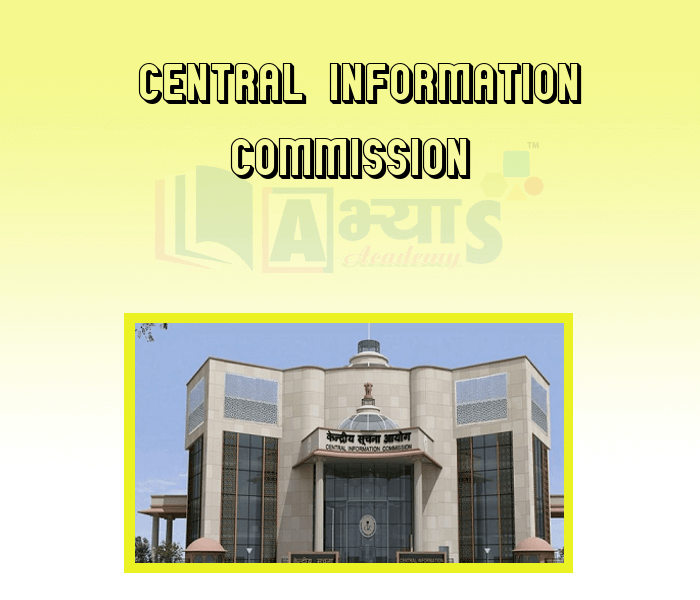Central Information Commission










Central Information Commission
The Central Information Commission was established in 2005 under the Right to Information Act 2005 through the Government Gazette notification of the Government of India
Thus, it is a legal body.
The Central Information Commission is a highly authorized independent body, which investigates and resolves complaints lodged in it, which deal with complaints and appeals about offices, financial institutions, public sector undertakings etc functioning under the Central Government and Union Territories.
This Commission consists of a Chief Commissioner and Information Commissioners, whose number should not exceed 10. All these are appointed by the President on the recommendation of a committee consisting of the Prime Minister as the head, the Leader of the Opposition in the Lok Sabha and a Cabinet Minister nominated by the Prime Minister.
The following qualifications are necessary to be appointed as members of the Commission-
He has enough experience in public life,
He has special experience in law, science and technology, social service, management, journalism, mass communication or administration, etc.
The ______________________ investigates and resolves complaints lodged in it. It deal with complaints and appeals about offices, financial institutions, public sector undertakings etc. | |||
| Right Option : A | |||
| View Explanation | |||
Which of the following are correct : (a) The member of the Central Information Commission has enough experience in public life. (b) The tenure of member of the Central Information Commission is 6 years. | |||
| Right Option : A | |||
| View Explanation | |||
Which of the following are correct : (a) The Central Information Commission was established in 2003. (b) The Central Information Commission investigates and resolves complaints lodged in it. (c) It consists of a Chief Commissioner and Information Commissioners, whose number should not exceed 10. | |||
| Right Option : B | |||
| View Explanation | |||
Students / Parents Reviews [10]
Being a parent, I saw my daughter improvement in her studies by seeing a good result in all day to day compititive exam TMO, NSO, IEO etc and as well as studies. I have got a fruitful result from my daughter.

Prisha Gupta
8thI have spent a wonderful time in Abhyas academy. It has made my reasoning more apt, English more stronger and Maths an interesting subject for me. It has given me a habbit of self studying

Yatharthi Sharma
10thOne of the best institutes to develope a child interest in studies.Provides SST and English knowledge also unlike other institutes. Teachers are co operative and friendly online tests andPPT develope practical knowledge also.

Aman Kumar Shrivastava
10thMy experience with Abhyas academy is very good. I did not think that my every subject coming here will be so strong. The main thing is that the online tests had made me learn here more things.

Hiya Gupta
8thAbout Abhyas metholodology the teachers are very nice and hardworking toward students.The Centre Head Mrs Anu Sethi is also a brilliant teacher.Abhyas has taught me how to overcome problems and has always taken my doubts and suppoeted me.

Shreya Shrivastava
8thAbhyas is a complete education Institute. Here extreme care is taken by teacher with the help of regular exam. Extra classes also conducted by the institute, if the student is weak.

Om Umang
10thIt has a great methodology. Students here can get analysis to their test quickly.We can learn easily through PPTs and the testing methods are good. We know that where we have to practice

Barkha Arora
10thAbhyas Methodology is very good. It is based on according to student and each child manages accordingly to its properly. Methodology has improved the abilities of students to shine them in future.

Manish Kumar
10thMy experience with Abhyas is very good. I have learnt many things here like vedic maths and reasoning also. Teachers here first take our doubts and then there are assignments to verify our weak points.

Shivam Rana
7thMy experience was very good with Abhyas academy. I am studying here from 6th class and I am satisfied by its results in my life. I improved a lot here ahead of school syllabus.
